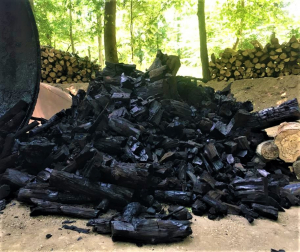Improving Soil Health with biochar

It was the first experience I’ve had of using a retort kiln. Normally I use a ring type.
The ice crystals were glistening on the metal door as I pulled hard. It creaked with resistance as the morning sun shone upon what was left of the wood. It had been reduced by half through a process called pyrolysis, (heating wood in the absence of oxygen). The fire turns volatile oils into gases which heat the wood.
I always love that first encounter when I open a kiln, picking up a handful of charcoal and dropping it gently; listening to the tinkle as pure carbon cascades down while sunlight and left over heat create peacock blues or rainbow patterns over the blackness.
Biochar contains tiny pores which have been cleared of all elements leaving pieces of charcoal like microscopic coral reefs. When good garden compost fills the spaces, bacteria migrate into the micro pores so when this living compost is applied to depleted soils, millions of tiny aerobic bacteria stream out, helping to bring life and structure back to the soil. One tiny bacterium can give rise to over eight million bacteria in 24 hours, so when ground to a powder, even a tiny amount can enrich a huge area.
The Iron Age saw waves of deforestation as trees were felled for the raging charcoal fuelled furnaces, and after hundreds of years, other forms of carbon, coal and oil, were discovered, fuelling the Industrial Revolution. These two reservoirs of solar energy enabled us to do about 100 times as much work as we could without it: they were the magic elixir of stored sunlight! We have all become so addicted to the magic convenience of this elixir that we are now as unaware as the passengers on the Titanic, not realising that our Earthship is in grave danger!
However, we each have an opportunity to contribute to great change and steer our course towards a brighter and more resilient future. Using charcoal in a more sustainable way is one way we can help – by restoring wildlife to our all-important soils.
When we apply biochar it is beneficial in many ways. It adds air, which helps the aerobic bacteria; it retains nutrients and micro flora, reducing the need for chemical fertilisers; it increases water holding capacity, reducing the chance of soils blowing away or being washed away. It improves conditions for plant growth and decreases soil acidity, and not least, it increases soil carbon which is great for plants.
And clearly, growing our food in healthy, alive soils can only be good to for growing healthy alive bodies!
By Clive Cobie




